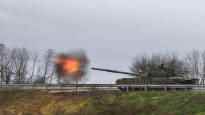Ukraine needs more and more support and for a long time. There is enough sympathy in Europe, but domestic crises also take away political attention, says researcher Timo Miettinen.
EU countries’ own problems take more and more attention away from supporting Ukraine as the war drags on. This is what an academy researcher at the University of Helsinki says Timo Miettinen.
– The most acute challenge is that the rise in energy prices in particular will take so much political attention in the member countries and turn the eyes inward in a certain way that it will become more difficult to help Ukraine.
According to Miettinen, there is still sympathy for Ukraine in the West and the EU, but in many countries domestic issues are starting to come before aid to Ukraine.
For example, Miettinen raises Hungary. It initially opposed the 18 billion support package, which the EU decided on on Thursday.
– There, domestic issues have come before helping Ukraine as issues that the citizens want the decision-makers to respond to. To a lesser extent, similar developments have been seen in other countries as well.
According to Miettinen, even seemingly small problems in the internal politics of countries can cause big obstacles in the attitude towards supporting Ukraine.
However, more support would be needed.
Aleksanteri Institute Visiting researcher Ilmari Käihkö assessed to on Friday that the support – and especially the armed support – should be more extensive, as the balance of power in the war may be changing in Russia’s favor.
On Monday, the president of Ukraine Volodymyr Zelenskyi asked the G7 countries for more gas and arms aid for the winter. On Thursday, the EU decided on the above-mentioned EUR 18 billion support and again on new sanctions against Russia.
Is the backbone of the West bending?
Director of the research college Tuomas Forsberg The University of Helsinki is not as worried about Ukraine falling off the West’s priority list.
– Of course there is concern, but there is still broad public support in key European countries for arms aid to Ukraine and other support as well, Forsberg says.
According to him, there is a pain threshold for Western support, but it is not there yet. According to Forsberg, the unity of the West under the leadership of the United States has been even greater than imagined at the beginning of the war.
– Russia has believed that the backbone of the West would bend more easily and aid would decrease. But even if some countries act differently, there are enough big countries in the West that Ukraine can hold its own with their support.
According to Forsberg, the essential question is also how neutral countries settle. Russia’s chances of succeeding in the war require it to receive significant help from countries other than those in the Western camp, says Forsberg.
Researcher: The slowdown in arms aid has prolonged the war
According to Timo Miettinen, there are differences between countries in how they take the lead in armed, humanitarian and financial aid.
He says that the easiest agreement for the EU countries has been found on humanitarian aid and, for example, providing asylum to Ukrainian refugees.
– The unity in itself has not broken down, but there are key differences in the extent to which support is prepared to be given – both within Europe and between Europe and the United States.
The most difficult tick in Europe has been arms aid.
In that, the countries have balanced the fact that armed aid is not interpreted as an attack, but that armed aid is specifically related to Ukraine’s defense struggle.
According to Forsberg, this has even prolonged the war.
– If the weapons that were only given in the summer had been given at the very beginning, we would already be in a different situation in the war, he states.
Also according to Miettinen, with regard to arms aid, it is about the extent to which countries dare to send it. The bigger question is related to the long-term reconstruction aid that Ukraine inevitably needs.
– The discussion about financing the reconstruction and the participation of the EU countries in it has not even started yet. Are the countries digging for a picture or would a common EU funding model be possible? That big question is still completely open, says Miettinen.
